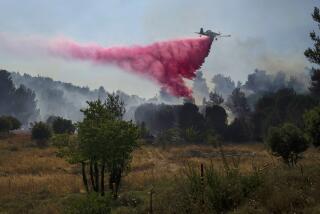Path Clearing for a New U.N. Resolution on Iraq
The demand by Spain’s incoming prime minister for a greater U.N. role in Iraq has increased momentum for a new Security Council resolution codifying the boundaries of power for the U.S.-led coalition and the world body after the transfer of sovereignty, scheduled for June 30.
Despite pressure from France and Germany for a new resolution, the U.S. had been resisting reopening U.N. Security Council negotiations over Iraq. But with Monday’s vow by Spain’s Jose Luis Rodriguez Zapatero to pull troops out of Iraq by June 30 unless the U.N. “takes charge,” U.S. and British officials have signaled that they are ready to begin paving the way for a new measure -- especially if it could help elicit more multinational troops.
Deputy Secretary of Defense Paul D. Wolfowitz, responding to a question Tuesday on CNN about whether a resolution could keep Spanish troops in Iraq, said: “Our feeling is that a resolution of that kind could be very helpful, and we’re inclined in that direction.... I would certainly hope that the Spaniards would find whatever reason they can to stay there.”
U.S. and British officials have sketched out the basic elements of a resolution but caution that the process is in its earliest stages. Nigel Sheinwald, foreign policy advisor to British Prime Minister Tony Blair, met with U.N. Secretary-General Kofi Annan and select Security Council members Tuesday to sound them out on three themes.
As it stands, the new resolution would reauthorize a multinational force, clarify the U.N.’s role and recognize the new interim government, diplomats said. The real drafting work will begin after Iraqis determine what kind of transitional body will take power after June 30. The leading proposals for a new interim government recommend a caretaker body with limited authority until elections can be held by the end of the year or early 2005 for a permanent government. But that setup could also leave a power vacuum in Iraq’s various ministries, now guided by U.S. and British advisors. Those advisors would probably remain in place, said a State Department official, but operate in the background, consulting with Iraqi ministers.
That plan has led some to question whether American influence will truly be limited after the transfer of sovereignty.
“We have to make sure that on June 30, there is not only a transfer of sovereignty in Iraq, but also the transfer of power,” said Algerian U.N. Ambassador Abdallah Baali. “Iraqis must effectively rule their country and have a sense of ownership of their destiny.”
The debate over the new resolution is bound to uncover sharply differing views about the new Iraq and the multinational troop presence there. Whereas Spain is asking that the U.N. take charge of the political process and perhaps even the multinational forces there, some Iraqi Governing Council members have indicated that they want the U.N. role to be limited to assistance and advice.
Adel Abdel Mehdi of the Supreme Council for Islamic Revolution in Iraq, a Shiite Muslim group represented on the Governing Council, said Thursday that the U.N. should not replace the U.S.-led authority in Iraq.
“The United Nations should play a role in supervising elections, in helping Iraq’s people, a role in multinational forces. But we don’t want the U.N. to decide the future of the Iraqi people or the legal framework for elections,” he said in an interview. “They are experts, professionals, but they are not much acquainted with realities in Iraq, so we feel that their solutions might play a negative role.”
Several Shiite members of the Governing Council have tried to prevent the U.N. from returning to help organize elections and guide the transfer of power.
But U.S. civilian administrator L. Paul Bremer III told Governing Council members Wednesday that they risked a confrontation with the U.S. if they did not ask the U.N. to help. A letter from the council inviting the U.N. back to Iraq arrived at U.N. headquarters Thursday, and U.N. envoy Lakhdar Brahimi and an electoral team will return to Iraq in the next two weeks to help nudge Iraqi leaders into deciding how to set up their interim administration and elect a permanent government.
“Nobody’s looking to set up a Potemkin government,” said a State Department official. “But in three months, we’ve got to find something that’s empowered and representative and palatable to everybody. That’s a tall order. But it will gain a lot of momentum when the U.N. gets there.”
Meanwhile, at the United Nations, Annan announced Friday that he is launching an “independent, high-level inquiry” into allegations of fraud, corruption and mismanagement involving the U.N.-run “oil-for-food” program that allowed Saddam Hussein’s regime -- then under international sanctions -- to sell oil to purchase humanitarian goods.
The charges stem from a report in a Baghdad newspaper that Hussein’s regime gave vouchers to hundreds of foreign political parties, officials and diplomats -- including the head of the program, Benon Sevan of Cyprus -- to buy millions of barrels of oil at a discount. The coupons allegedly were resold at market value to oil refinery middlemen. Sevan has denied any wrongdoing.
A report by the U.S. General Accounting Office released Thursday calculated that Hussein’s regime gained more than $10.1 billion in illicit proceeds related to the oil-for-food program.
The U.N.’s Office for Internal Oversight Services has started an investigation that will involve poring over as many as 80 boxes of documents from the program. But a broader inquiry will require the cooperation of dozens of countries, including some of those who helped set up -- and allegedly profited from -- the program.
Times staff writer Alissa J. Rubin in Baghdad contributed to this report.
More to Read
Sign up for Essential California
The most important California stories and recommendations in your inbox every morning.
You may occasionally receive promotional content from the Los Angeles Times.







